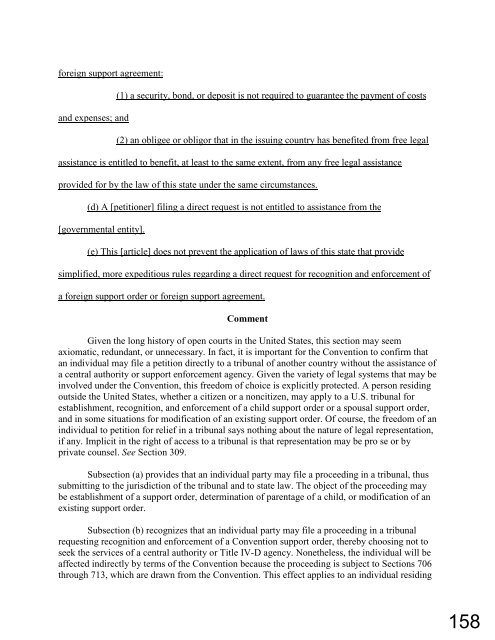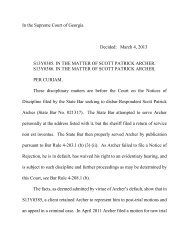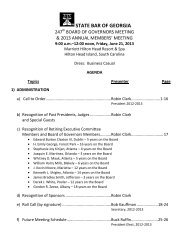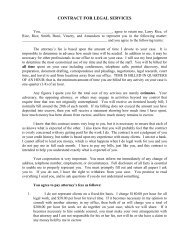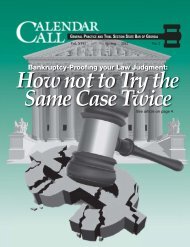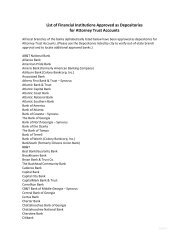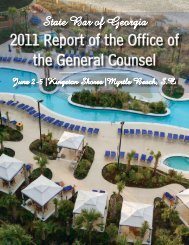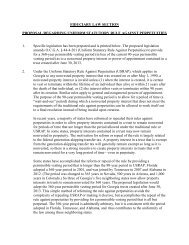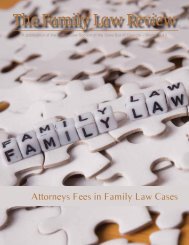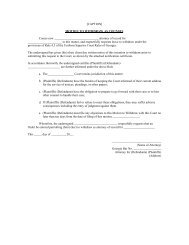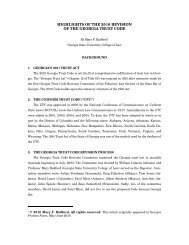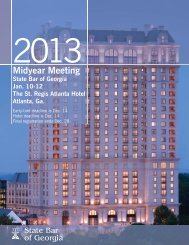2008 Amendments to the Uniform Interstate Family Support Act ...
2008 Amendments to the Uniform Interstate Family Support Act ...
2008 Amendments to the Uniform Interstate Family Support Act ...
Create successful ePaper yourself
Turn your PDF publications into a flip-book with our unique Google optimized e-Paper software.
foreign support agreement:<br />
and expenses; and<br />
(1) a security, bond, or deposit is not required <strong>to</strong> guarantee <strong>the</strong> payment of costs<br />
(2) an obligee or obligor that in <strong>the</strong> issuing country has benefited from free legal<br />
assistance is entitled <strong>to</strong> benefit, at least <strong>to</strong> <strong>the</strong> same extent, from any free legal assistance<br />
provided for by <strong>the</strong> law of this state under <strong>the</strong> same circumstances.<br />
(d) A [petitioner] filing a direct request is not entitled <strong>to</strong> assistance from <strong>the</strong><br />
[governmental entity].<br />
(e) This [article] does not prevent <strong>the</strong> application of laws of this state that provide<br />
simplified, more expeditious rules regarding a direct request for recognition and enforcement of<br />
a foreign support order or foreign support agreement.<br />
Comment<br />
Given <strong>the</strong> long his<strong>to</strong>ry of open courts in <strong>the</strong> United States, this section may seem<br />
axiomatic, redundant, or unnecessary. In fact, it is important for <strong>the</strong> Convention <strong>to</strong> confirm that<br />
an individual may file a petition directly <strong>to</strong> a tribunal of ano<strong>the</strong>r country without <strong>the</strong> assistance of<br />
a central authority or support enforcement agency. Given <strong>the</strong> variety of legal systems that may be<br />
involved under <strong>the</strong> Convention, this freedom of choice is explicitly protected. A person residing<br />
outside <strong>the</strong> United States, whe<strong>the</strong>r a citizen or a noncitizen, may apply <strong>to</strong> a U.S. tribunal for<br />
establishment, recognition, and enforcement of a child support order or a spousal support order,<br />
and in some situations for modification of an existing support order. Of course, <strong>the</strong> freedom of an<br />
individual <strong>to</strong> petition for relief in a tribunal says nothing about <strong>the</strong> nature of legal representation,<br />
if any. Implicit in <strong>the</strong> right of access <strong>to</strong> a tribunal is that representation may be pro se or by<br />
private counsel. See Section 309.<br />
Subsection (a) provides that an individual party may file a proceeding in a tribunal, thus<br />
submitting <strong>to</strong> <strong>the</strong> jurisdiction of <strong>the</strong> tribunal and <strong>to</strong> state law. The object of <strong>the</strong> proceeding may<br />
be establishment of a support order, determination of parentage of a child, or modification of an<br />
existing support order.<br />
Subsection (b) recognizes that an individual party may file a proceeding in a tribunal<br />
requesting recognition and enforcement of a Convention support order, <strong>the</strong>reby choosing not <strong>to</strong><br />
seek <strong>the</strong> services of a central authority or Title IV-D agency. None<strong>the</strong>less, <strong>the</strong> individual will be<br />
affected indirectly by terms of <strong>the</strong> Convention because <strong>the</strong> proceeding is subject <strong>to</strong> Sections 706<br />
through 713, which are drawn from <strong>the</strong> Convention. This effect applies <strong>to</strong> an individual residing<br />
158


